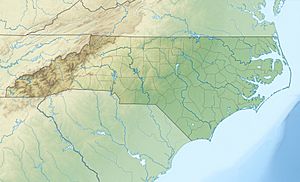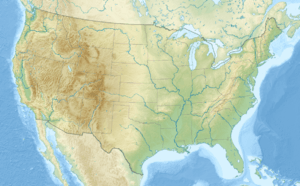Indian Creek (Deep River tributary) facts for kids
Quick facts for kids Indian Creek |
|
|---|---|
|
Location of Indian Creek mouth
|
|
| Other name(s) | Tributary to Deep River |
| Country | United States |
| State | North Carolina |
| County | Chatham County |
| Physical characteristics | |
| Main source | Bear Creek divide about 0.5 miles west of Goldston, North Carolina 440 ft (130 m) 35°35′46″N 079°21′07″W / 35.59611°N 79.35194°W |
| River mouth | Deep River about 1.5 miles southwest of Gulf, North Carolina 210 ft (64 m) 35°32′40″N 079°19′26″W / 35.54444°N 79.32389°W |
| Length | 7.15 mi (11.51 km) |
| Basin features | |
| Progression | generally southeast |
| River system | Deep River |
| Basin size | 25.92 square miles (67.1 km2) |
| Tributaries |
|
| Bridges | Goldston-Glendon Road, Roberts Chapel Road, Goldston-Carbonton Road |
Indian Creek is a small stream, about 7.15 mi (11.51 km) long, located in Chatham County, North Carolina. It flows into the Deep River, acting as one of its important smaller branches.
Contents
Discovering Indian Creek's Journey
Indian Creek begins its journey near Goldston, North Carolina. It starts about half a mile (0.8 km) west of the town. From there, the creek flows mostly towards the southeast.
Where Indian Creek Ends
The creek eventually joins the larger Deep River. This meeting point is about 1.5 miles (2.4 km) southwest of Gulf, North Carolina.
Understanding Indian Creek's Environment
The land area that drains into Indian Creek is called its watershed. This watershed covers about 25.92 square miles (67.1 km2) (67.1 km²). This means all the rain that falls in this area eventually flows into Indian Creek.
Rainfall and Forests in the Watershed
The Indian Creek watershed receives a good amount of rain each year, about 47.7 inches (121 cm). A large part of this area, about 54%, is covered by forests. These forests are important for keeping the water clean and providing homes for wildlife.
 | Madam C. J. Walker |
 | Janet Emerson Bashen |
 | Annie Turnbo Malone |
 | Maggie L. Walker |



